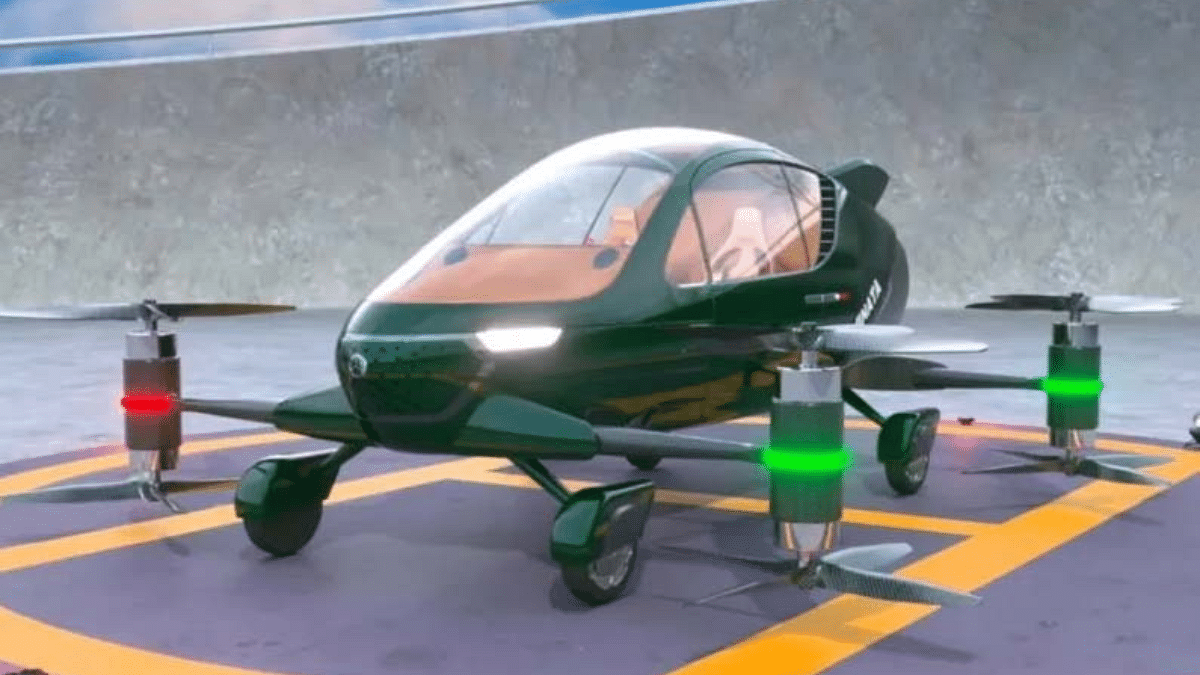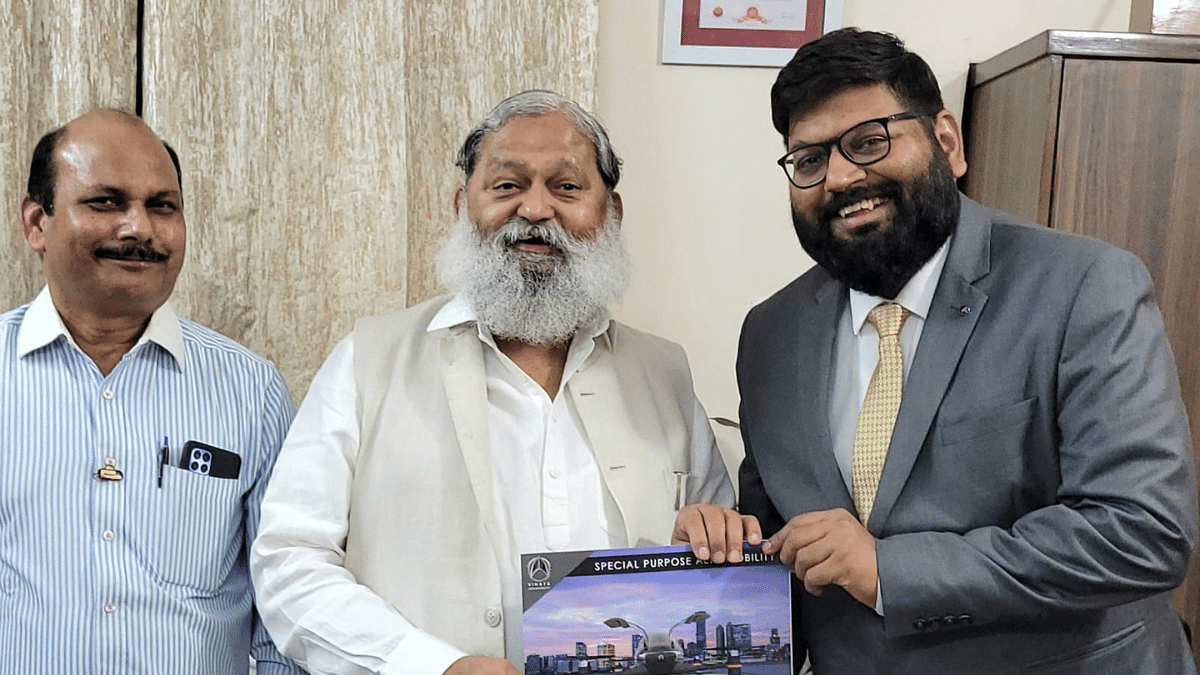Haryana, meet the Jetsons — Chennai start-up with flying car prototype wants to manufacture in state
Gurugram: Haryana could soon have a manufacturing unit for hybrid flying cars — a vehicle that combines the features of an electric motor vehicle and a small aircraft.
Chennai-based startup Vinata Aeromobility has approached the state’s home minister Anil Vij to set up a manufacturing unit in the state, said a statement issued by Vij’s office Sunday. The company had reportedly showcased the hybrid flying car prototype at Helitech Expo at ExCel, London, in October 2021.
According to the statement, the Haryana home minister had asked Vinata Aeromobility, which already had a manufacturing unit in Chennai, to consider Ambala for a second unit. Vij is an MLA from Ambala Cantonment.
“Yogesh Ramanathan, founder and CEO (chief executive officer) of Vinata Aeromobility met Haryana home and health minister Anil Vij at his residence today [Sunday] in Ambala proposing to set up a ‘Hybrid Electric Flying Car’ factory near the Ring Road in Ambala,” said the statement issued by Vij’s office.
The Haryana home minister told ThePrint that although the company wanted to set up a unit in Gurugram [also in Haryana], he promised them cheaper land and other facilities at Ambala.
“Ramanathan came to meet me at Ambala and said his company’s prototype of his fully autonomous hybrid flying car has already got the central government’s nod and the company was in the process of expanding its manufacturing capacity in view of the possible demand this can have,” he said.
Vij added: “He discussed his plan to set up a unit at Gurugram. I offered him to think about setting up the unit in Ambala instead since the land cost is quite low here. Let’s see what the company decides.”
ThePrint reached Vinata Aeromobility Yogesh Ramanathan via calls and text messages. This report will be updated if and when a response is received.
According to Vij, companies are reluctant to set up manufacturing units in Ambala because of the lack of a domestic airport. For this, Vij said the state government is developing an airport in the city, with Chief Minister Manohar Lal Khattar laying its foundation stone on 15 October.
The airport or the ‘Civil Enclave’ as it’s called, is being reportedly developed under Union Ministry of Civil Aviation’s Regional Connectivity Scheme (RCS), or Udan 3.0.
According to Vij, the airport won’t take more than a few months to set up.
According to Vinata Aeromobility’s website, the Chennai-based startup is developing “next level transportation [which] will make city travel much faster, easier and less expensive”.
Rakesh Chhabra, president of the Sonipat-based Rai Industry Association — a network that, according to its website, works as a bridge between the MSMEs and the government departments — told ThePrint that the idea of a flying car could take off in India “provided it’s safe and offers value for money”.
Not everyone is on board, however, with the concern of “cost effectivity” raised by some.
Also Read: ‘Our focus is on EVs, but there are many Indians who still want diesel vehicles,’ says Tata Motors MD
EV, uses biofuel — what Vinata plans for its ‘hybrid car’

The communication by Vij’s office quoted Vinata Aeromobility CEO, Ramanathan, as saying that the flying car could be used to ferry passengers, and also be used as an air ambulance and for cargo transportation.
“The Hybrid Electric Flying Car is the future of mobility that is taking shape as electric vehicles. Flying cars are the future of the world and it has already started in the country also,” the statement said, adding that the company’s Chennai unit is small and that “the company plans to set up a big factory in Haryana”.
It also said the vehicle will be a hybrid electric car equipped with eight fixed-pitch propellers, landing gear and an electric motor. It can fly at a speed of 350 km per hour and can also run on biofuel, the statement added.
The Vinata Aeromobility website estimates that by 2030, 60 percent of the world population will live in urban areas.
“Already, there are 1.2 billion passenger vehicles on the roads. By 2030, it is projected to reach 1.6 billion. As cities grow, the sustainable transportation of people and goods will become all the more important and complex,” the website says.
For many city dwellers, transportation “means stress, congestion and delays”, the website adds.
“While mobility will continue to be a prime area of concern for individuals, infrastructure will be unable to handle the demands, and a sustainable solution to transportation woes will need to emerge. This is where Vinata Aeromobility is stepping in with their full autonomous flying cars,” it goes on to say.
Talking about the hybrid vehicle, Chabbra, who also owns Choudhry Enterprises, a Sonipat-based company that manufactures automobile accessories, said, “Our younger generation believes in accepting newer things. In this matter, we are even ahead of Europe. Initially, when Tesla brought driverless cars, people were sceptical. But now, people in India are eagerly waiting for this company to set up its unit in India, especially since Tesla CEO Elon Musk met PM Narendra Modi during his visit to the US in June”.
But some, like Fatehabad-based automobile dealer Rishi Batra, are not sold on the idea.
“An average Indian looks at the price factor first. Take the example of electric vehicles (EVs). Because of its higher costs, less than one percent of the total customers we receive opt for an EV,” he said. “Unless the new technology is cost effective for common people, it is unlikely to replace the normal vehicles on the road.”
(Edited by Uttara Ramaswamy)
Also Read: With 7-month soar, India’s 2023 EV sales already 88% of 2022 numbers. Here’s what helped business

